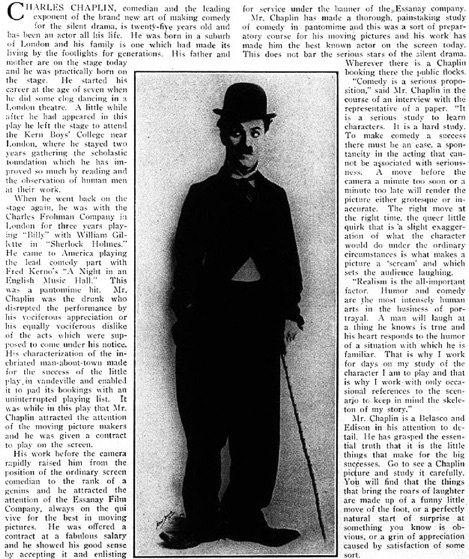A Woman Clippings 4/72
Victor Eubank, Photo-Play Review, New York, April 20. 1915.
The Transparency (...)
Large, Hand-Colored Pictures
Size 22 x 28 inches of 75 Prominent Film Favorites,
including some of the Comedians in character
make-up, $0.75 each, framed with glass, $2.50.
Photo. Charlie Chaplin. (...)
KRAUS MFG. CO.
(...) Moving Picture World, May 15, 1915
& This Cut
made for Newspaper or Program advertising
is the kind we furnish of the popular
players – 500 different Names. It will print on the cheapest
quality pf paper.
Price, 40 cents each. (...)
KRAUS MFG. CO.
(...) Moving Picture World, July 3, 1915
„It is the little things that make for the big successes“
Editorial content. „The Funniest Man of the Screen
By Victor Eubank
Charles Chaplin, comedian and the leading
exponent of the brand new art of making comedy for the silent
drama, is twenty-five years old and has been an actor
all his life. He was born in a suburb of London and his family
is one which had made its living by the footlights for
generations. His father and mother are on the stage today
and he was practically born on the stage. He started
his career at the age of seven when he did some clog dancing
in a London theatre. A little while after he had appeared
in this play he left the stage to attend the Kern Boys‘ College
near London, where he stayed two years gathering
the scholastic foundation which he has improved so much
by reading and the observation of human men
at their work.
When he went back on the stage again, he was with
the Charles Frohman Company in London for three
years playing ,Billy‘ with William Holmes. He came to America
playing the lead comedy part with Fred Karno‘s A Night
in an English Music Hall. This was a pantomimic hit. Mr. Chaplin
was the drunk who disrupted the performance by his
vociferous appreciation or his equally vociferous dislike
of the acts which were supposed to come under
his notice. His characterization of the inebriated man-about-town
made for the success of the little play in vaudeville and
enabled it to pad its bookings with an uninterrupted playing
list. It was while in this play that Mr. Chaplin attracted
the attention of the moving picture makers and he was given
a contract to play on the screen.
His work before the camera rapidly raised him from the
position of the ordinary screen comedian to the rank of a genius
and he attracted the attention of the Essanay Company,
always on the qui vive for the best in moving pictures. He was
offered a contract at a fabulous salary and he showed
his good sense by accepting it and enlisting for service under
the banner of the Essanay company.
Mr. Chaplin has made a thorough, painstaking study
of comedy in pantomime and this was a sort of preparatory
course for his moving pictures and his work has made
him the best known actor on the screen today. This does not
bar the serious stars of the silent drama. Wherever there
is a Chaplin booking there the public flocks.
,Comedy is a serious proposition,‘ said Mr. Chaplin
in the course of an interview with the representative
of a paper. ,It is a serious study to learn characters. It is a hard
study. To make comedy a success there must be an
ease, a spontaneity in the acting that cannot be associated
with seriousness. A move before the camera a minute
too soon or a minute too late will render the picture either
grotesque or inaccurate. The right move at the right
time, the queer little quirk that is a slight exaggeration of what
makes a picture a ,scream‘ and which sets the audience
laughing.
,Realism is the all-important factor. Humor and comedy
are the most intensely human arts in the business
of portrayal. A man will laugh at a thing he knows is true and
his heart responds to the humor of a situation with which
he is familiar. That is why I work for days on my study of the
character I am to play and that is why I work with only
occasional references to the scenario to keep in mind the
skeleton of my story.‘
Mr. Chaplin is a Belasco and Edison in his attention
to detail. He has grasped the essential truth that
it is the little things that make for the big successes. Go to see
a Chaplin picture and study it carefully. You will find
that the things that bring the roars of laughter are made
up of a funny little move of the foot, or a perfectly
natural start of surprise at something you know is obvious,
or a grin of appreciation caused by satisfaction
of some sort.“
Redaktioneller Inhalt




